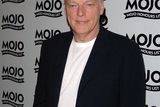Settling scores: the music makers turning their talents to film and TV soundtracks
A slew of engrossing television drama series snared us over the past 12 months with the adrenalised spy thriller Killing Eve standing especially tall.
Much was made of the stunning performances from Sandra Oh and Jodie Comer as, respectively, dogged MI5 agent and catch-me-if-you-can assassin, as well as the whip-smart script from Phoebe Waller-Bridge.
But there was another aspect that ensured the show was such a critical and commercial hit: Killing Eve's marvellous soundtrack. Besides a diet of coolly seductive songs from the likes of Cigarettes After Sex and Françoise Hardy, the series boasted brilliantly cinematic tracks from Unloved. If that name doesn't ring a bell, the man behind the group, David Holmes, certainly will.
The Belfast DJ-turned-soundtrack composer extraordinaire has delivered some of the sweetest movie scores of recent times thanks to his work with directors like Steven Soderbergh (who so loved Holmes's cinematic album, Let's Get Killed, he invited him to make the music for Out of Sight, his 1998 crime romance with George Clooney and Jennifer Lopez) and he has mastered the art of making music that works beautifully for the movie or TV show in question and also as an album proper. And, once again, that's the case with Killing Eve.
Extraordinaire: Belfast's David Holmes is behind a string of soundtracks
If Holmes had no difficultly making the move into the soundtracks game with such big hits as Ocean's 11, a glut of rock and electronica artists have followed suit, and it's a trend that's become especially apparent in recent times.
Some of the most acclaimed dramas on both big and small screen over the past year have featured soundtracks from musicians on temporary hiatus from bands or others keen to take on the demands of a special commission.
The remake of the 'giallo' horror masterpiece Suspiria may have aroused a mixed reaction from both critics and audiences, but most were in agreement that the soundtrack was deliciously sinister and memorable.
Those unsure as to who was behind it would have immediately copped on when the singular vocals of Radiohead's Thom Yorke appeared on the delicate piano-led 'Suspirium'. It's an album that feels as though it was a labour of love for him and in its own way, it's more compelling than his previous solo work.
Suspiria may have been Yorke's first soundtrack, but his Radiohead bandmate Jonny Greenwood is an old hand at the art by now. Greenwood has struck up a fantastic collaboration with Paul Thomas Anderson, one of the greatest American auteur directors of his generation.
There was a suitably frantic score for There Will Be Blood and a gorgeously elegant one for last year's Phantom Thread (both films star Daniel Day-Lewis in the lead role). And Greenwood's superb score for the L Ron Hubbard-inspired The Master helped make that Joaquin Phoenix vehicle hugely captivating.
Anderson has returned the favour, so to speak, by directing several of the videos from Radiohead's most recent album, A Moon Shaped Pool.
And Greenwood's compositional skills can be appreciated on You Were Never Really Here, featuring another striking Phoenix performance and directed by Scottish art-house filmmaker Lynne Ramsay.
It's probably fair to say that few of us spend much time thinking about the alternative rock band Pop Will Eat Itself who caused small ripples in the early 1990s, yet former member Clint Mansell is in constant demand for his exceptional soundtrack work.
It was he who was behind the arresting score for Ben Wheatley's bracing adaptation of JG Ballard's High-Rise a few years ago. His credits include Darren Aronofsky's Black Swan and The Wrestler, as well as Wheatley's recently released tale of family dysfunction, Happy New Year, Colin Burstead. Mansell also scored Titans, last year's highly acclaimed superheroes TV series and his music can also be heard on Mute, the widely panned film from David Bowie's son, Duncan Jones.
Trent Reznor has also seamlessly made the transition from rock to major league movie soundtracks. The Nine Inch Nails leader has a long-standing working relationship with David Fincher on such films as The Social Network and The Girl with the Dragon Tattoo.
Reznor is prolific, too: among his recent work is the score for Bird Box - a big hit for Netflix right now - as well as composing original music for one of 2019's most anticipated releases for thriller fans, Joe Wright's adaptation of AJ Finn's page-turner, The Woman in the Window, featuring the all-star cast of Amy Adams, Gary Oldman and Julianne Moore.
Reznor can bring in the sort of orchestral moments that old-school movie composers like John Barry would have done, but his rock pedigree is rarely far from the surface, especially when it comes to his fondness for percussion.
It's that mix of influences that sees directors and producers turn increasingly to artists whose background isn't confined by a grounding in classical music. Take Mary Queen of Scots, for instance. Out this weekend, the regal period drama with Saoirse Ronan in the titular role boasts a soundtrack composed by the Anglo-German electronica musician Max Richter.
It's informed by the Elizabethan music of the time but there's a very modern sensibility at play, too. The album was released at the start of the year and it's an intriguing introduction to Richter's superlative work. For another of his projects - and one that's completely different - have a listen to From Sleep: it's an extract from his eight-hour concept album inspired by the neuroscience of sleep.
There's nothing restful about Kendrick Lamar's pulsating score for Black Panther, the second-highest grossing movie worldwide in 2018. Lamar delivered a suitably epic soundtrack for the superhero film, and the resulting album - with 14 original compositions featuring James Blake and Vince Staples among others - serves as an impressive stop-gap between 2017's Damn album and a future release, expected to drop close to year end.
If people like Lamar are unlikely to go down the soundtrack route exclusively, for others it's the perfect career trajectory. The late composer Jóhann Jóhannsson started out in shoe-gaze bands in his native Iceland before finding his métier with the minimally minded classical compositions. Early soundtracks, such as his beguiling score for the impressionistic Copenhagen Dreams short film sent him on the way to Hollywood, and one of his last works before his accidental death last year aged just 48 was the soundtrack for the Nicolas Cage-starring thriller Mandy. Arguably the best thing about the film, it offered a pointer to the remarkable career that was surely ahead of him.
Killing Eve, meanwhile, returns for a second season this year. Filming was completed before Christmas and David Holmes will once again be guiding the tiller when it comes to its soundtrack.
Holmes may be the Irish composer who's made greatest strides in this competitive world but Something Happens guitarist Ray Harman boasts a home-grown CV that's far more prolific.
The Dubliner's credits includes RTÉ's recent hit Taken Down as well as The Young Offenders and Love/Hate. And Harman was also responsible for the music in a pair of very different documentaries - The Farthest (Emer Reynolds' absorbing film on a space exploration mission) and The Game: The Story of Hurling.
Join the Irish Independent WhatsApp channel
Stay up to date with all the latest news














